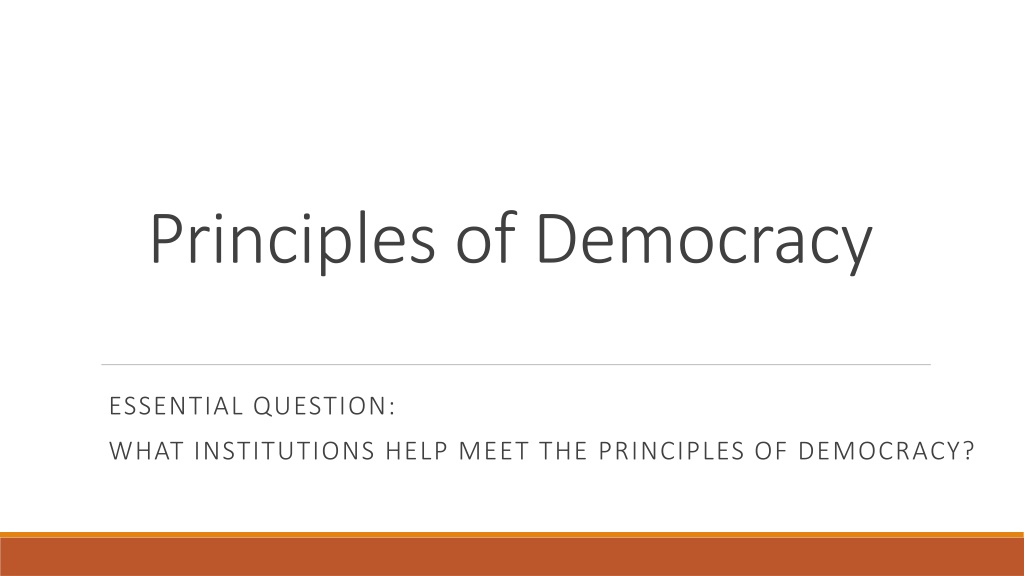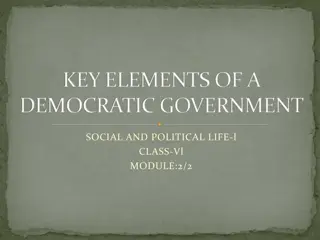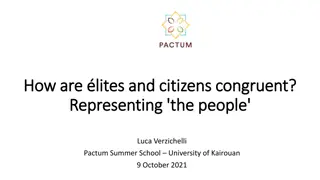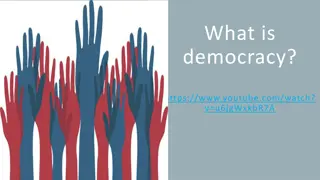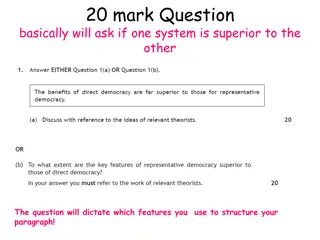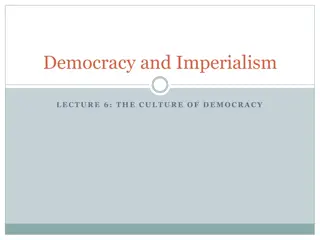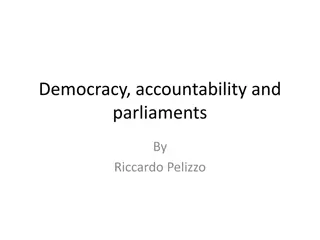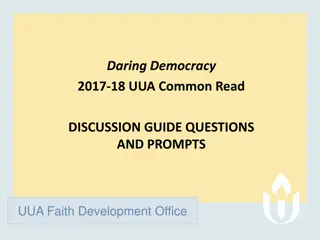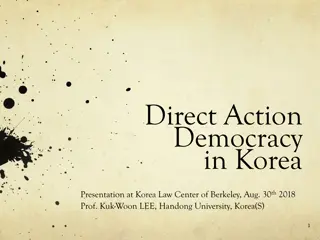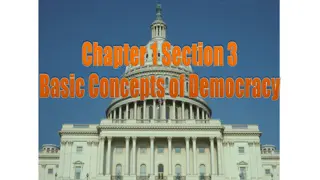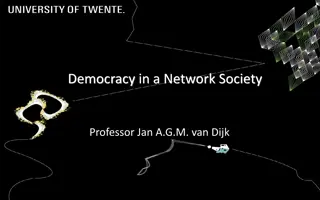Understanding the Principles of Democracy
Principles of democracy are crucial for the functioning of a democratic society. Institutions such as citizen participation, free and fair elections, accepting election results, rule of law, majority rule with minority rights, and transparency play essential roles in upholding democratic principles. By ensuring active citizen engagement, fair electoral processes, adherence to laws, protection of minority rights, and transparency in governance, a democracy can strive towards a more inclusive and accountable system of governance.
Download Presentation

Please find below an Image/Link to download the presentation.
The content on the website is provided AS IS for your information and personal use only. It may not be sold, licensed, or shared on other websites without obtaining consent from the author. Download presentation by click this link. If you encounter any issues during the download, it is possible that the publisher has removed the file from their server.
E N D
Presentation Transcript
Principles of Democracy ESSENTIAL QUESTION: WHAT INSTITUTIONS HELP MEET THE PRINCIPLES OF DEMOCRACY?
Warm-up: Levels of Freedom Which continent has the most freedom? Which has the least freedom? What do you think accounts for this difference?
What is a Principle? A principle is a fundamental truth that serves as a foundation for a system of belief, behavior, or reasoning. An institution is a practice or organization that is put in place to act on an idea. Many countries claim to be democrativ but have government institutions that do not meet the principles of democracy. There are 14 in total and no democracy is truly perfect.
Jigsaw You will now be assigned one of the 14 principles of democracy to study with a partner. You will create an exhibit about your theory using textbook pages 18-21. You will have 12 minutes to create your exhibit and then you will present it to the class using the document camera. Title Description: Example: Rating (1-10) and Reasoning:
Principles of Democracy 1. CITIZEN PARTICIPATION 2. FREE AND FAIR ELECTIONS One of the most well-known ways citizens express their will is electing representatives. Elections must be held regularly. Elections must be fair by allowing all people to vote and all votes to count equily. Participation can take many forms including ldebating issues, voting, attending community meetings, serving in the military, or serving on a jury. Being a citizen is a duty of all people because it helps democracy stay true its intentions.
Principles of Democracy 3. ACCEPTING ELECTION RESULTS 4. RULE OF LAW In a democracy no one can be above the law not even an elected leader or a king. Everyone must obey the law and be punished consistently for violations. There are winners and loser in an election and both must accept the results with grace. The losing party must hand over power peafully or democracy will fail.
Principles of Democracy 5. MAJORITY RULE WITH MINORITY RIGHTS Decisions are made according to what the majority wants, but must be tolerant of others. Those in a racial, ethnic, religious, or other minority group must still be allowed to influence government. 6. TRANSPARENCY This means keeping the public informed of all actions. Often this means holding public meetings and publishing minutes for those who can't be there. The press also must be allowed to investigate and speak freely.
Principles of Democracy 7. ACCOUNTABILITY CHECKPOINT! Elected and appointed officials are responsible for their actions. They must do the will of their constituants and not what pleases themselves or their friends. What does this cartoon imply about Obama's accountability?
Principles of Democracy 8. LIMITED GOVERNMENT WITH BILL OF RIGHTS Most democratic governments have a list of citizens' rights and freedoms. It protects the people from the gobernment abusing its power. A bill of rights becomes part of the constitution and is harder for the government to change. 9. CONTROL OF CORRUPTION This occurs when a government or candidate funds their own benefit. To protect against abuse there are often checks put on branches of government by the others. There are also independent courts and agencies.
Principles of Democracy 10. ECONOMIC FREEDOM 11. EQUALITY The governemnt must allow private ownership of property and businesses. People can choose their own work and join unions. The role a government should play in guiding the economy is strongly debate to this day. All individuals should be valued equally. They should be free from discrimination and treated equally before the law. All peole can express their culture, personality, and beliefs.
Principles of Democracy 8. LIMITED GOVERNMENT WITH BILL OF RIGHTS Most democratic governments have a list of citizens' rights and freedoms. It protects the people from the gobernment abusing its power. A bill of rights becomes part of the constitution and is harder for the government to change. 9. CONTROL OF CORRUPTION This occurs when a government or candidate funds their own benefit. To protect against abuse there are often checks put on branches of government by the others. There are also independent courts and agencies.
Principles of Democracy 12. HUMAN RIGHTS PROTECTED 13. INDEPENDENT JUDICIARY These are the rights that all people have because they are human. There is a Universal Declaration of Human Rights that was written and approved by members of the United Nations. Courts are fair and impartial. They are separate from all other branches to avoid influence. Judges shoul also not be corrupt or obligated to individuals, businesses, or political groups.
Principles of Democracy 14. COMPETING POLITICAL PARTIES LEARNING CHECK! Most democratic governments have a list of citizens' rights and freedoms. It protects the people from the gobernment abusing its power. A bill of rights becomes part of the constitution and is harder for the government to change. Choose one principle of Democracy that you think is the least important and explain why. Create questions to accompany your Cornell notes for this section.
